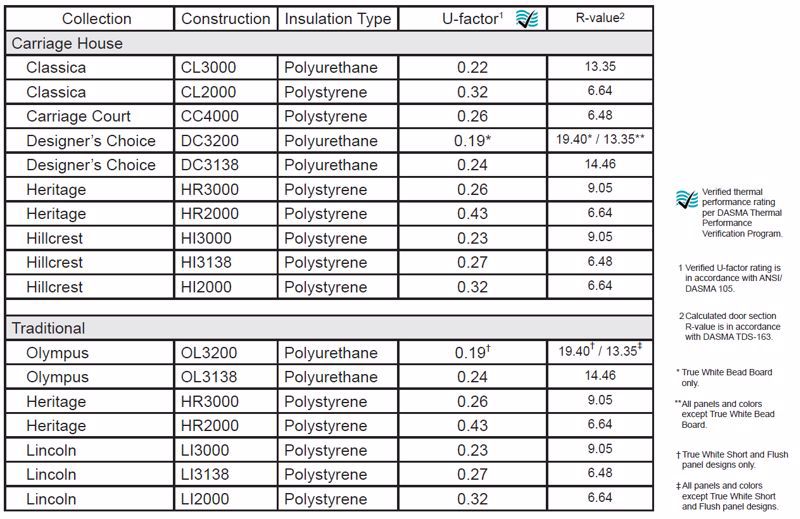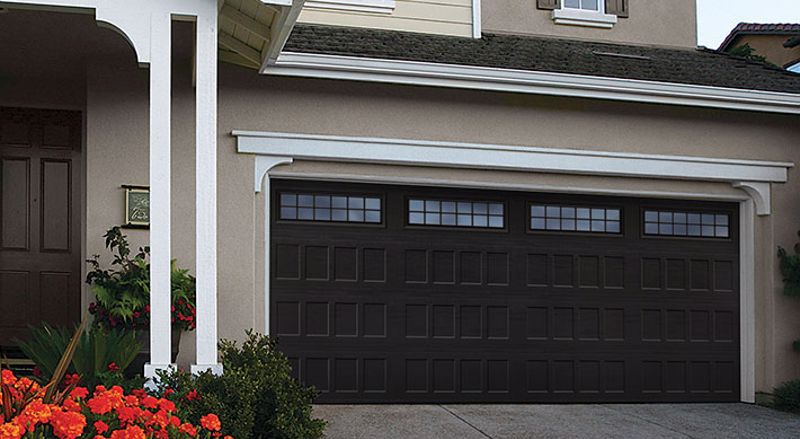Garage Door R-Value and U-Factor 101: Understanding Energy Efficiency
- May 8, 2024
- Design Inspiration
- 5 minute read

A garage door is often the largest opening to your home, making these spaces vulnerable to moderate and extreme weather conditions that can affect your energy bill. How? Air leakage and heat flow from the garage can affect your home’s insulation greatly.
An insulated garage door can help reduce the heat transfer to and from your garage and other areas of your home, thus improving overall energy efficiency. Even detached garages, especially those used for more than simply storing a vehicle, can benefit from added insulation.
Until recently, thermal efficiency for a garage door was measured using what’s called R-value. But now, there’s an industry shift to a different measure of thermal performance, called U-factor.
Here, we’re examining both types of measurements, how they’re different, and why garage doors that have been graded using either of these standards are beneficial.
What Is R-Value vs. U-Factor?
R-value is the longstanding measurement used by garage door manufacturers to determine thermal resistance, whereas U-factor measures thermal transmittance, the rate of heat transfer through a complete garage door.
The lower the U-factor means the better insulation and less heat transfer, which is desirable for maintaining a comfortable temperature inside the garage and potentially reducing energy costs. Higher heat transfer means a greater loss of energy from either heat or cold.
As a participant in the DASMA Thermal Performance Verification Program, Amarr shows both R-value and U-factor measurements.
U-Factor vs. R-Value: How Are They Different?
Now that we know what each measurement is independently, let’s do a quick side-by-side comparison.
The U-factor and the R-value are both measurements used to assess the thermal performance of insulation materials, including garage doors.
U-Factor Chart
In summary, U-factor measures the rate of heat transfer through a material. It is not the reciprocal of R-value, although it is often mistaken to be. According to Door & Access Systems Manufactures Assosiation (DASMA), “these two methods are not comparable and are obtained by entirely different methods reflecting different aspects of thermal performance.”
With that in mind, U-factor is typically used to evaluate the insulating properties of entire garage door assemblies, such as door sections, tracks, hardware and accessories like windows.
The lower the U-factor, the better the insulation performance. See how Amarr garage doors rank in ways of U-factor and R-value.

To reiterate, R-value measures the thermal resistance of a material, indicating how well a material resists heat transfer. The higher the R-value, the better the insulation. R-value is commonly used to measure the insulating properties of individual materials like batt insulation or foam insulation.
In the context of garage doors, R-value accounts for an individual door section, not the entire assembly like U-factor does.
While both U-factor and R-value provide information about insulation performance, they represent it in slightly different ways. U-factor directly measures heat transfer, while R-value measures thermal resistance. Generally, a lower U-factor and a higher R-value indicate better insulation.
What Is the Main Benefit of a Garage Door With a Low U-Factor (Or High R-Value)?
A garage door with insulation and a R-value or U-factor measurement brings many benefits to you and your home such as enhanced comfort, cost savings and better durability; however, the biggest benefit is increased energy efficiency. Here’s why…
Increased Energy Efficiency
A low U-factor indicates better insulation, meaning the garage door can help maintain a consistent temperature inside the garage. This can lead to reduced energy consumption for heating or cooling the space, especially if the garage is attached to the house or if there are rooms above it.
Additionally, by reducing energy consumption, a garage door with a low U-factor can help lower greenhouse gas emissions associated with heating and cooling systems. This can contribute to a more sustainable lifestyle and help mitigate climate change.
Garage Door U-Factor FAQ
Do you still have questions about U-factor? Amarr has some answers!
How Do I Interpret U-Factor Values?
In general, the lower the U-factor the better. If you’re unsure about the U-factor of a garage door you’re interested in, seek guidance from a garage door professional.
What Factors Influence the U-Factor of a Door or Window?
Many things impact the U-factor rating of doors and window systems, such as the type of insulation material used, how many layers of material are used in construction, and the quality of installation.
What Are the Recommended U-Factor Values for Garage Doors in My Area?
Depending on the climate zone and local building codes, recommended U-factor values may vary. Insulated garage doors help maintain the temperature inside a garage in both cold and warm climates. If you’re unsure about what’s recommended for you, we recommend contacting a garage door professional.
How Can I Improve the U-Factor of My Existing Garage Door?
To improve the U-factor of your garage door system, you improve the weather seal around the garage door to achieve better energy efficiency and comfort. Alternatively, you can replace your garage door altogether and purchase one that has an appropriate U-factor for your area.
Amarr Offers Superior U-Factor-Measured Garage Doors
Amarr offers a variety of garage doors, each with a superior U-Factor that translates into energy savings for your home. Our Designer’s Choice line features triple-layer construction and insulation that brings a low U-factor for better thermal efficiency.

Our Olympus and Classica garage doors also have low U-factor ratings if you are looking for different door designs that meet energy efficiency expectations.
Having the right insulation product can make all the difference for your home’s thermal regulation capabilities. Choosing between polystyrene or polyurethane insulation will determine the thermal performance level of a garage door.
Amarr partners with a network of independent, professional garage door dealers who can walk you through your selection process to ensure your choice of garage door provides an optimal U-factor that meets your needs.
Ready to get started? Find an Amarr dealer near you.

